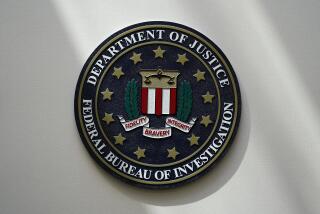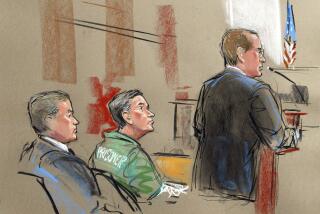A Top Post Deserves a Top Person
President Bush has gone out of his way to remind the world--and an increasingly restless American public--why the war on terrorism must be waged, despite being long and difficult. Bush might have more success if he would reconsider his support of Cuban American activist Otto J. Reich, who once tried to help an accused terrorist enter the U.S. Bush has nominated Reich to be assistant secretary of State for the Western Hemisphere.
Reich was U.S. ambassador to Venezuela in 1988, when an egregious case of terrorism came to an inconclusive end. He used his office to help one of those accused in the case, Orlando Bosch.
For the record:
12:00 a.m. Nov. 29, 2001 For the Record
Los Angeles Times Thursday November 29, 2001 Home Edition California Part B Page 15 Op Ed Desk 3 inches; 83 words Type of Material: Correction
Orlando Bosch--A Nov. 11 column by Frank del Olmo mistakenly reported that former President Bush pardoned Cuban terrorist Orlando Bosch. In fact, Bosch was granted a limited parole into the United States by the Bush administration Justice Department in July 1990. An earlier Justice Department decision found Bosch deportable as an undesirable alien, but no foreign country would agree to accept him--except Cuba, with which the U.S. government has no extradition agreement. Rather than detain him indefinitely, the U.S. government paroled Bosch to live with his family in the Miami area.
Bosch was first arrested by U.S. authorities in 1968, after he fired a recoilless rifle at a Polish tanker docked in the port of Miami, damaging the vessel but causing no loss of life. The federal indictment in that case detailed conspiracies by Bosch “to damage and destroy ... ships and planes” of other nations that did business with Cuba, including U.S. allies. He got 10 years in prison, was paroled in 1972 and fled the U.S., resurfacing four years later in Venezuela. Authorities arrested him in October 1976, a few days after a Cuban jetliner was downed over the Caribbean Sea by a bomb that killed all 73 people on board.
Bosch was jailed in Venezuela for 11 years while charges against him were adjudicated. At trial, evidence was presented that the two men convicted of homicide in the bombing were in contact with Bosch before and after the incident. Despite his links to the bombers, Bosch was acquitted.
At the time, Reich had just arrived as U.S. ambassador in Caracas, an appointee of President Reagan. He began pestering the State Department about Bosch soon after Bosch was released from prison, according to declassified diplomatic cables. Reich said that Bosch might be targeted by Cuban assassins and asked that he be given a U.S. visa.
Reich’s superiors at State had the good sense to say no. But in 1988, Bosch entered the U.S. illegally and was arrested by immigration agents. That began another long process of appeals that culminated in a 1989 decision by the Justice Department ordering Bosch deported. But Bosch never left. At 74, he lives in the Miami area, still officially wanted by the Cuban government for his alleged role in downing their jetliner. His deportation was delayed because his case became a cause celebre to Cuban exiles in south Florida, who eventually brought the matter to the attention of former President Bush. In 1990, the elder Bush granted a presidential pardon to Bosch.
In hindsight, that decision looks abysmal. But what I find more troubling is the current President Bush’s decision to stand by Reich as his nominee to be this country’s top diplomat for Latin America.
Recently, in reply to written questions by the Senate Foreign Relations Committee, Reich tried to shrug off the Bosch case. To the question, “Do you consider Orlando Bosch to be a terrorist?” Reich wrote: “I do not have sufficient knowledge of Mr. Bosch’s criminal activities or record of convictions to pass judgment on his legal status.” Perhaps realizing how bad such evasiveness sounds in the aftermath of Sept. 11, Reich added, “I do consider that persons who blow up a civilian aircraft are committing an act of terrorism.”
This is the guy Bush wants to sell the war on terrorism to Latin America?
The president needs to find someone who thinks and writes like Joe D. Whitley, the associate attorney general who wrote the 1989 decision ordering Bosch deported. It includes this eloquent passage: “The United States cannot tolerate the inherent inhumanity of terrorism as a way of settling disputes. Appeasement of those who use force will only breed more terrorists. We must look on terrorism as a universal evil, even if it is directed toward those with whom we have no political sympathy.”
Strong, admirable words. Bush might even consider using them in his next speech against terrorism. But he’d sound more sincere if he didn’t have an appointee like Reich lurking in the background.
More to Read
Sign up for Essential California
The most important California stories and recommendations in your inbox every morning.
You may occasionally receive promotional content from the Los Angeles Times.










